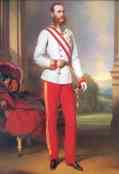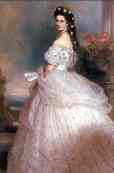Olga's Gallery
Dear Friends of Art,
There are two new portraits in the section of Franz X. Winterhalter.
They show Emperor Franz Josef and his wife Empress Elisabeth, of Austria.
This newsletter is dedicated to them.
The Last Habsburgs
In 1835, an absolutely incapable emperor Ferdinand I (1793-1875) came to power in the large Austrian empire, one of the main European states; he suffered from epilepsy and could not rule his country. He was married, but had no heir.
In 1848, in the midst of great European revolutions, which effected Austria as well, the emperor's sister-in-law, archduchess Sophie, a clever, energetic and ambitious woman, “the only man in the imperial family” used the situation to make Ferdinand abdicate in favor of his nephew and her son Franz Josef (Francis Joseph), who was only 18.
 Franz
Josef was born on August 18, 1830, son of the archduke Francis Charles
(1802-1878), the second son of Emperor Francis I, and his wife archduchess
Sophie, daughter of the king of Bavaria, Maximilian I. Franz Josef got
a good education, had a talent for languages and knew French, Italian,
Hungarian and Czech. Sophie, a deeply religious woman, brought up her children
in Catholicism. But Franz Josef did not share his mother's deep passion
for religion; everything mystical was alien to his sober-minded and reasonable
nature. Art, poetry and music did not take much place in his education,
and did not interest him. A good deal of attention was given to his military
training, which was new for the House of the
Habsburgs. Franz Josef was the first heir to the throne who was brought
up as a military officer. Though he never showed himself as a capable military
commander, this education formed the personality of the future monarch
– for all his life he had love for order, discipline, uniform, and strict
subordination. The main purpose of his life became the duty of the monarch.
His formal education stopped at the age of 18, and he did not get fundamental
knowledge in political and jurisdictional sciences so necessary to a ruler.
Franz
Josef was born on August 18, 1830, son of the archduke Francis Charles
(1802-1878), the second son of Emperor Francis I, and his wife archduchess
Sophie, daughter of the king of Bavaria, Maximilian I. Franz Josef got
a good education, had a talent for languages and knew French, Italian,
Hungarian and Czech. Sophie, a deeply religious woman, brought up her children
in Catholicism. But Franz Josef did not share his mother's deep passion
for religion; everything mystical was alien to his sober-minded and reasonable
nature. Art, poetry and music did not take much place in his education,
and did not interest him. A good deal of attention was given to his military
training, which was new for the House of the
Habsburgs. Franz Josef was the first heir to the throne who was brought
up as a military officer. Though he never showed himself as a capable military
commander, this education formed the personality of the future monarch
– for all his life he had love for order, discipline, uniform, and strict
subordination. The main purpose of his life became the duty of the monarch.
His formal education stopped at the age of 18, and he did not get fundamental
knowledge in political and jurisdictional sciences so necessary to a ruler.
Thus on December 2, 1848, Franz Josef started his long and unsuccessful reign of the Austrian empire, which was restless with social and national contradictions. His first task was to subdue the Hungarian revolt and pacify Lombardy. Having accomplished this, the aspirations of the various nationalities of the empire were rigorously suppressed, and a determined effort was made to fuse them into one state. Influenced by his mother the emperor reasserted his claim to rule as an absolute monarch; the policy of bureaucratic centralization was again reverted to; and a close alliance was signed with the church to combat liberal progress.
 A
task of state importance was to get the young emperor married. Sophie,
who interfered in everything, took the vital mission of finding a bride
into her own hands. After some searching she chose him a bride from her
own Bavarian house. Her choice was her niece Helene, daughter of her sister
Duchess Ludovika and Duke Maximilian in Bavaria. Sophie
considered that Helene was ready to fulfill the difficult duties of an
empress with her character and education. But Franz Josef fell in
love with the younger sister – charming Elisabeth, and destroyed his mother's
plans. Sophie would never forgive Elisabeth for this. Franz Josef and Eugenie
Amalie Elisabeth of Wittelsbach were married on April 24, 1754. She was
about 17 when she became Empress of Austria.
A
task of state importance was to get the young emperor married. Sophie,
who interfered in everything, took the vital mission of finding a bride
into her own hands. After some searching she chose him a bride from her
own Bavarian house. Her choice was her niece Helene, daughter of her sister
Duchess Ludovika and Duke Maximilian in Bavaria. Sophie
considered that Helene was ready to fulfill the difficult duties of an
empress with her character and education. But Franz Josef fell in
love with the younger sister – charming Elisabeth, and destroyed his mother's
plans. Sophie would never forgive Elisabeth for this. Franz Josef and Eugenie
Amalie Elisabeth of Wittelsbach were married on April 24, 1754. She was
about 17 when she became Empress of Austria.
The young people were absolutely different in character and upbringing. She was brought up free, not knowing any restraint, in a highly independent manner and fully enjoyed the turbulence and carefree attitude of her father's castle. She was romantic, loved poetry and music; her spiritual life was more important for her than reality. He was practical and pedantic, military and realistic. But at the moment, young and in love, they were happy.
Unfortunately very soon Elisabeth began to feel like a bird in a gilded
cage. Sophie, wanting to make her daughter-in-law into a real empress,
as she understood the role, controlled and dictated her every move. Court
etiquette and formalities limited her freedom and oppressed Elisabeth.
She quickly became an object of mockery for the courtiers, who, led by
Sophie, criticized and ridiculed her. Josef, who deeply respected his mother,
was afraid to reprimand Sophie and defend his wife. Elisabeth felt more
and more alone. This loneliness only deepened when her mother-in-law took
her children,
Sophie Friderike Dorothea Maria Josepha (1855-1857), Gisela Louise
Marie (1856-1932), and Rudolf Franz Karl Joseph (1858-1889) and
started bringing them up by herself, allowing Elisabeth to
only see her children from time to time and always in her presence.
Elisabeth wrote poems, read much and trained in horse riding for several
hours a day. Later to get rid of the importunate wardship she started to
travel.
Elisabeth did not interfere in politics except for once, when she played a definite role in the regulation of the conflict with Hungary in the 1860s. During the visit of the imperial couple to Hungary, the Hungarians were delighted with Elisabeth's beauty. Tall and slender, with classical features and big bright eyes, luxurious chestnut hair she left nobody indifferent. Feeling the sincere love and admiration, which she did not receive in the Vienna court, she answered with mutual sympathy. She learned the Hungarian language and was fond of the Hungarian literature. She tried to spend more time in her Hungarian estates. Feeling lonely in Vienna, where the real queen was Sophie, Elisabeth formed her own court from Magyar ladies. To much distaste of Sophie, Elisabeth had contacts with the leaders of the Hungarian opposition and she managed to influence Franz's attitude towards the Hungarian problems. In 1867 Franz Josef reformed the country into the dual Austro-Hungarian monarchy with constitutional rule, Hungary got more rights in deciding its internal problems. Franz Joseph and Elisabeth were crowned on June 8, 1867 in Budapest as the King and Queen of Hungary. In Austria itself Elisabeth tried to avoid all official ceremonies.
In 1868 in Hungary, Elisabeth gave birth to her forth child Marie Valerie Mathilde Amalie (1868-1939). She flatly refused to part with the girl. At last she knew all the pleasures and troubles of motherhood. It was an almost possessive love: Elisabeth never parted with Marie Valerie until the marriage of the latter.
In January 1889, her only son, Rudolf, the Crown Prince, committed suicide with his mistress Marie Vetsera in Mayerling; at least this is the official version of the death, which still remains a mystery. There are a lot of myths and theories of what and why happened, but as the dynasty tried to destroy all the evidence of the tragedy, it's difficult to come to one conclusion. Rudolf had been depressed for many years, feeling rejected both by his mother and father. Elisabeth understood too well her part in the tragedy and couldn't forgive herself. She never recovered from that blow. Her last years she spent in melancholy and pessimistic thoughts.
She died nine years later and also tragically – an Italian anarchist, Luigi Lucheni, fatally stabbed her to death in Geneva September 10, 1898.
Franz Josef outlived his wife by 18 years. All his reign was a slow and steady decline of the great European empire. In 1859 Austria lost Lombardy, then in 1866, Venice. The emperor then tried to adopt a more conciliatory policy towards the various national groups within the empire and wanted to give some form of self-government to the Austrian Slavs, but was opposed by German and Magyar nobles, which further weakened the Habsburg positions. The annexation of Bosnia-Herzegovina in 1908 agitated Europe; the attack on Serbia, which followed after the assassination of heir to the Austrian throne, Franz Ferdinand (Franz Josef's nephew), in 1914 precipitated World War I.
Franz Josef died on November 21, 1916. He did not live to see Austria's defeat in the war. His grand nephew, Karl I assumed the throne for two years, but was the last Habsburg monarch.
You will also find new sections of French painters James Tissot and Henri Fantin-Latour.